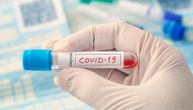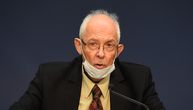The results are encouraging, but there will still be coronavisus cases: Testing error can be 10%
Deputy Director of the Clinic for Infectious and Tropical Diseases of the Clinical Center of Serbia commented on the possibility of returning the infection in the fall, the WHO alerts, ad partial relaxation of anti-coronavirus measures
Deputy Director of the Clinic for Infectious and Tropical Diseases in Belgrade Ivana Milosevic commented on Tuesday morning in Serbian talks shows that out of 3,111 tested samples, 312 tested positive for the new coronavirus - saying these 24-hour results were encouraging.
"These are encouraging results, then we see more people at the beginning of the clinical picture. Now that we are able to test more patients, there is no reason to wait" - and she called on everyone with the slightest symptoms to report, noting that it is a big deal that a lab is open at the Clinical Center of Serbia that will test up to 2,000 samples daily.
At the same time, Milosevic commented that previously the biggest obstacle to treatment was that the results of the tests were long awaited, and that the new laboratory would shorten the waiting time.
She also commented on the PCR test, which provincial secretary Zoran Gojkovic said at a press conference yesterday was unreliable anywhere in the world, adding that the "false positivity, that is, negativity" was up to ten percent. However, her assessment is that the test is good and that the human factor cannot be neglected when commenting on the precision of the test.
"I do think the test is sufficiently good. When we look back, we will be able to provide more accurate information. We must not forget that wherever there is a human factor, there is a possibility of error,"- she said, adding that mistakes are possible when taking a swab, then packing and transporting tests, and that there should be no errors in the process, because the process is automated.
She said that does not mean that the test results should be taken as inaccurate.
"People shouldn't be scared, because we are very careful. Do not forget that we are guided not only by the test but also by the clinical picture. The false positive or negative trajectory can go up to 10 percent," she said, noting that the accuracy of the test may depend on the sampling site, and that the said PCR test would be the most sensitive, for example. With the sample take from the lungs, but that the health of the medical staff would also be significantly affected in the same way, as the possibility of infection would be significantly higher.
Milosevic also appealed to those who recovered from Covid-19 to volunteer giving their blood plasma - adding that this solution was temporary.
"First, I would urge anyone who has been cured to give plasma, because it can be a lifeline for some patients. I have a patient who has received it and whose treatment is ongoing, I would not comment further but would urge that it be given. It is not a mass-scale drug, but it should be accessible to everyone. That's the current solution," she explained.
At the same time, she commented on the World Health Organization (WHO) allegations that the worst is yet to come, saying that there is no relaxation, and that her estimate is that there will still bemore patients.
"I think first of all we must not get relaxed. The big thing is that we are moving towards a partial relaxation of (anti-corona) measures. That can't happen overnight. By reducing the number of patients, clinical-hospital centers will return to their regimen of work, but I think we will definitely have patients. It also does not mean that we will not have them in the fall," she said, questioning the possible acquired immunity, such as, for example, immunity to influenza, when then cured remains protected only for a certain period of time.
The deputy director of the KCS Infectious Clinic said the vaccine should not have any delay and that it was a lifeline.
"There should be no delay when the vaccine appears. Thanks to vaccines, I have no problem today with diseases that have claimed millions of lives before," the doctor warned.
(Telegraf.rs)

